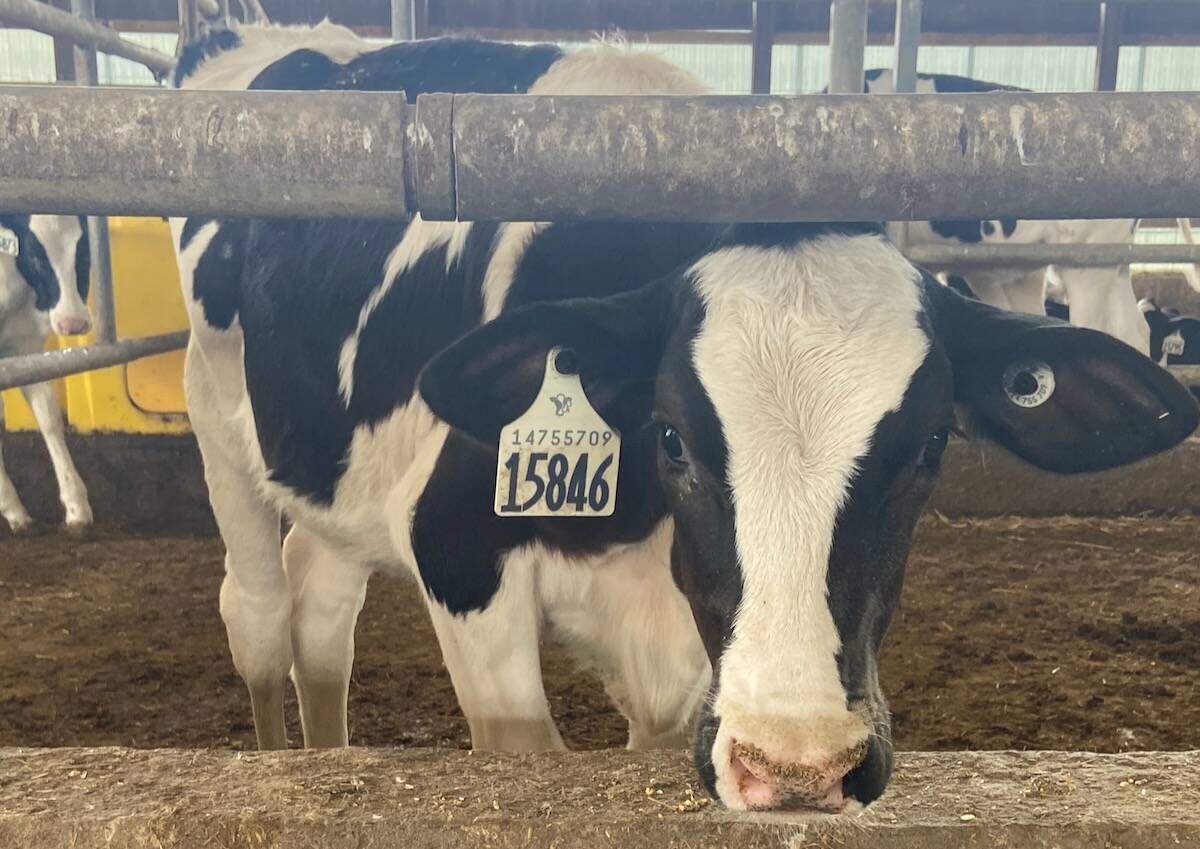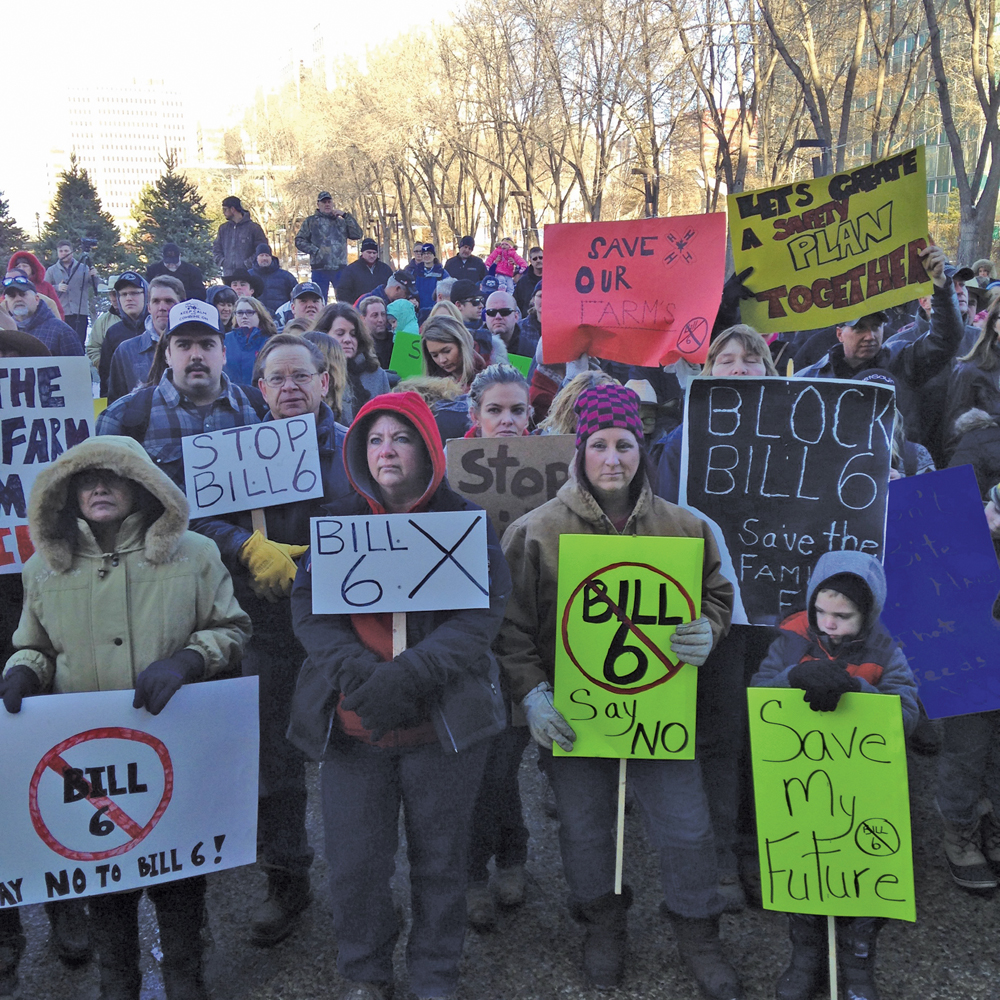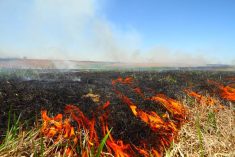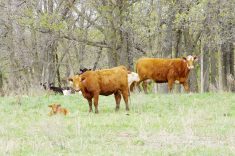The NDP government said it just wanted to make farms more safe, but instead ignited a firestorm.
But faced with massive outrage and demonstrations from farmers and ranchers to Bill 6, the government backtracked and apologized for what it called “miscommunication.”
“Myself, MLAs, ministers, and our premier have all heard from farmers and ranchers who are concerned this bill could hurt their way of life,” Agriculture Minister Oneil Carlier told producers in Red Deer last week. “I take these concerns seriously because that was never the intent of this bill… We’re sorry. We should have provided the details on how we plan to protect farm and ranch families when we first introduced this bill.”
Read Also

Rural municipalities push legalization of raw milk onto provincial agenda
Drinking raw milk comes with numerous risks, but proponents of a proposed amendment to Alberta’s Food and Drug Act say legalizing its sale could be a boon for small farms in the province.
Carlier then promised that Occupational Health and Safety regulations would only apply to paid employees on farms — not families or friends and neighbours who help out. Rules affecting hours of work and other employment standards won’t take effect until spring 2017 and only after extensive consultations.
“We need to get the regulations right and work with you to do that,” said Carlier. “The farm life that everyone in this room holds dear will go on without government intervention.”
- More on the Alberta Farmer: Alta. to tweak farm worker bill for ‘clarity’
The specific amendments were not released as Alberta Farmer was going to press, but Carlier said the rules would be “common sense” and practical. He also said workers’ compensation coverage would only be mandatory for paid employees and would be implemented in the spring (instead of Jan. 1). Employees will be given the right to unionize, but Carlier said the province has no choice in the matter because of a recent Supreme Court of Canada ruling that gives all workers that right.
“But when the law comes into effect, your employees will not automatically become union members,” said Carlier. “In fact, in other provinces with this legislation already in place, the rate of unionization is extremely low.”
Those assurances won Carlier a brief round of applause at the Red Deer meeting, but the anger stirred up by Bill 6 (the Enhanced Protection for Farm and Ranch Workers Act) may take a long time to subside.

Anger ignited
The Red Deer meeting was second in a series of consultations — initially set at five, then nine, and now apparently extended throughout the winter. The first, in Grande Prairie, was the match that lit the fuse of farmer indignation across the province.
“The meeting was not what people were expecting — either on the government side or on the farmer side,” said Greg Sears, a Sexsmith producer who attended the Grande Prairie meeting on Nov. 26.
Farmers were looking for answers to specific questions while government officials were “looking for input,” he said.
Facilitators had planned to have people circulate through information stations to have their questions answered, but that idea was shot down quickly by the packed room of angry producers.
“It wasn’t a very comfortable place to be for the first hour,” said Sears. “People do not feel that there’s been appropriate consultation for a very emotionally charged issue for most of the agricultural community, whether you support the legislation or not.
“It’s a very emotional, very personal thing for people.”
Producers were also furious that the original bill had already passed first reading before the first consultation took place.
“It’s happened so quickly, and when anything like this happens quickly, you start to wonder what the problem is and why the sense of urgency is so high so fast,” said Lee Markert, a farmer from Vulcan and chair of the Alberta Canola Producers Commission.

Alberta Canola and a few other farm groups met with government officials in the summer and again in October, and along with Alberta Wheat met with Alberta Jobs, Skills, Training, and Labour Minister Lori Sigurdson.
“At that meeting, we basically just expressed how we are in fact in favour of safer farms, but also that we’re large proponents of the education aspect of it,” said Markert.
“We feel that there’s a road to safer farms and better farm safety awareness through extension and education of producers. We cautioned the government on regulating for the sake of regulating and that perhaps there was a more streamlined approach to dealing with farm safety as a whole.”
Instead the government opted to quickly push ahead with legislation, introducing a “vague” bill that “doesn’t really tell us anything,” he said.
Kevin Steeves was one of thousands of producers trying to make sense of how the legislation would affect farmers — and why the government initially seemed intent on rushing it through.
“There’s still so many unanswered questions,” said Steeves, who runs a mixed farm with his family near Rimbey.
“Producers will do whatever it takes to be safe, but they want to be consulted. And they want to make sure that it’s actually going to work.”
‘Status quo isn’t acceptable’
Despite the outcry over the lack of consultation, farmers like Kevin Serfas think the legislation is “a long time coming.”
“Let’s be honest — some of this stuff should be legislated,” said Serfas, who runs a large mixed operation near Turin. “We’re not in the 1950s anymore. These workers need to be protected somehow.”
About five years ago, the Serfas family had a farm accident that “opened (their) eyes about farm safety.”
“My brother’s leg got crushed by a motor, and from that time forward, we’ve carried private benefits, and all of our workers are covered under workers’ compensation,” said Serfas.
Beiseker-area farmer Patrick Kunz — who doesn’t have employees — agrees there’s a need for workers’ compensation coverage, but he doesn’t know how Occupational Health and Safety regulations are going to fit.
“Farming does need some changes, obviously,” he said. “It’s a different industry, but that doesn’t excuse it.”
The Alberta Federation of Agriculture supports workers’ compensation coverage as a “good risk management tool,” while Alberta Canola is in favour of some workplace safety regulations, such as the ability to investigate on-farm fatalities. Alberta Beef Producers said it “accepts” having Occupational Health and Safety inspectors investigate fatalities and serious injuries on farms. It also supports insurance coverage for employees — but said employers “should have the option of selecting the most appropriate insurance for their employees.”
The legislation does have some good in it, said farmer Jeff Nonay, who runs a mixed dairy, grain, and potato farm near Legal.
“There’s a legitimate reason for the government to want to do these things,” said Nonay, who has eight to 10 employees.
“We need to recognize that the status quo isn’t acceptable, but feeling like we’re being dictated to by a government that was elected outside of the rural areas makes it really uncomfortable.”
Alberta is the only province that doesn’t have these rules, he said, adding that “sometimes (the industry) can’t see the forest for the trees.”
“Maybe we need to look at what they’re telling us about what looks unsafe from an outside perspective,” said Nonay. “That’s where it would be nice to have some outside consultation. That doesn’t seem to have happened.”
Focus on regulations
Consultation is critical, said Doug Chorney, former president of Keystone Agricultural Producers, Manitoba’s main farm group.
“Often, the people who are going to be responsible for enforcing these regulations haven’t got the farm experience or background,” said Chorney, who grows grains and vegetables.
“Helping them develop regulations that are manageable and, in fact, practical is critical.”
“In Manitoba, we had the benefit of that. I would encourage Alberta producers to become engaged in that discussion as well.”
Manitoba amended its Workplace Health and Safety Act and made WCB mandatory in 2009.
“We had the government regulators at the table asking us the questions they felt they needed answers to, and I think that was a critical part of our process,” said Chorney.
“Alberta could benefit from looking at that process and listening to farmers before getting down to the final regulations… There’s no sense in bringing in regulations that are unenforceable or that will never work for the industry.”
The focus should be on the regulations, said Sears.
“We know this is a special situation. We live where we work. We need to address all those concerns about lifestyle and family in the technical regulations,” he said. “That’s where we need participation from producers, who need to step up and do it in a respectful manner.”















